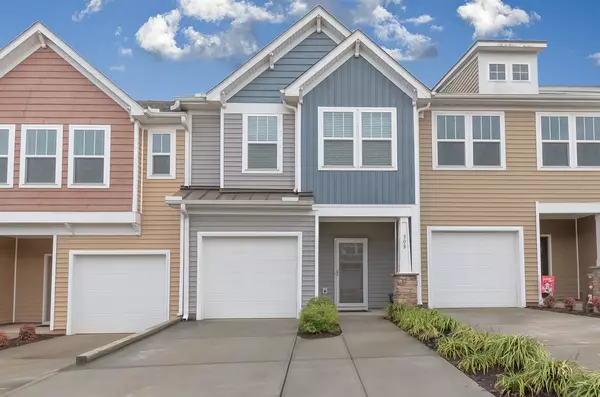
How to Sell Your Home Fast: Proven Strategies for Today’s Market
How to Sell Your Home Fast: Proven Strategies for Today’s Market In today’s competitive real estate market, many homeowners are looking for ways to sell their homes quickly and for top dollar. Whether you’re relocating for a job, downsizing, or just ready for a change, the process of selling a home can feel overwhelming—especially if time is of the essence. Fortunately, with the right strategies, you can streamline the sale and attract serious buyers. Here’s how to sell your home fast in today’s market. 1. Price Your Home Competitively from the Start One of the most important factors in selling your home quickly is pricing it right. Overpricing can lead to your home sitting on the market for too long, which may cause buyers to assume something is wrong with the property. On the flip side, pricing too low can mean leaving money on the table. The best approach is to price your home competitively based on a thorough analysis of comparable homes (or “comps”) in your area. A knowledgeable real estate agent will help you evaluate recent sales data and current market conditions to set a price that’s attractive to buyers but still maximizes your return. 2. Enhance Curb Appeal First impressions matter, and curb appeal plays a huge role in attracting potential buyers. A well-maintained exterior invites buyers in and gives the impression that the home has been cared for. Here are a few easy ways to boost curb appeal: Freshen up the landscaping: Mow the lawn, trim bushes, plant seasonal flowers, and remove any dead plants. Paint the front door: A pop of color on the front door can make your home stand out. Pressure wash: Clean the driveway, sidewalks, and siding to make everything look bright and new. Update lighting: New outdoor light fixtures can make your home feel more welcoming. These small improvements can make a big difference and help your home catch the eye of buyers browsing listings online or driving by. 3. Declutter and Depersonalize Your Space Buyers want to envision themselves living in your home, and it’s easier for them to do that in a clean, clutter-free environment. Before listing your home, declutter every room and remove personal items like family photos or unique decor. Consider renting a storage unit to temporarily store excess furniture and belongings. The goal is to make your home feel spacious, neutral, and move-in ready. A well-organized home can also give buyers the impression that the home has been well cared for, increasing its appeal. 4. Invest in Professional Photography Since most buyers start their home search online, high-quality photos are essential for making a great first impression. Professional photography can showcase your home’s best features and draw more buyers to schedule a showing. Make sure your listing photos are bright, well-composed, and highlight the key selling points of your home. If your property has unique features like a large backyard or updated kitchen, ensure those are highlighted in the photos. 5. Stage Your Home for Success Staging helps buyers visualize how they can use the space and can make a home feel more inviting. You don’t necessarily need to hire a professional stager, but there are simple steps you can take to create a staged look: Arrange furniture to create a natural flow in each room. Add fresh flowers or greenery to bring life to the space. Use neutral colors and minimal decor to create a clean, sophisticated look. Set the dining room table or create cozy reading nooks to highlight how different areas of the home can be used. Staging can help your home stand out from the competition, especially if buyers are comparing multiple properties. 6. Be Flexible with Showings The more accessible your home is to potential buyers, the faster it will sell. If you want to sell quickly, you may need to accommodate showings at different times, including evenings and weekends. While it can be inconvenient to have frequent showings, being flexible ensures that more buyers have the opportunity to see your home, which increases your chances of receiving offers. 7. Market Your Home Effectively Your real estate agent should have a solid marketing plan to get your home in front of as many qualified buyers as possible. In addition to listing your home on the Multiple Listing Service (MLS), make sure your home is promoted through: Social media platforms Real estate websites like Zillow and Realtor.com Targeted email campaigns Open houses and virtual tours Maximizing your home’s exposure is key to attracting serious buyers quickly. 8. Consider Pre-Listing Inspections Some sellers opt to have a home inspection done before listing. This can help you identify and address any issues before potential buyers discover them during their inspection. Fixing issues early on can prevent delays during the negotiation process and give buyers confidence that the home is in good condition. 9. Offer Incentives to Buyers If you’re in a rush to sell, offering incentives can make your home more attractive to buyers. These might include covering some or all of the closing costs, offering a home warranty, or being flexible with the closing date. These small perks can make a big difference in persuading a buyer to choose your home over others. 10. Work with an Experienced Agent The final and most important tip for selling your home quickly is to work with an experienced real estate agent - an agent who knows the local market, can help you price your home correctly, market it effectively, and can navigate negotiations with potential buyers. They’ll also manage the paperwork and logistics to ensure the sale goes as smoothly and quickly as possible. Ready to Sell Your Home in Eau Claire? If you're looking to sell your home in Eau Claire or the surrounding areas, I can help! With my market expertise and proven selling strategies, I’ll ensure your home attracts the right buyers and closes on your timeline. Contact Brad Bemowski today for your free home evaluation and personalized selling plan!

How Elections Impact the Real Estate Market
How Elections Impact the Real Estate Market Elections, particularly national and local ones, can significantly influence the real estate market. As homeowners, buyers, and investors, understanding the potential effects of elections on real estate can help you make more informed decisions, whether you’re buying, selling, or simply monitoring the market. Let's explore some key ways elections can impact the real estate landscape. 1. Economic Uncertainty and Buyer Behavior Elections often bring uncertainty to the economy, and this uncertainty can affect how both buyers and sellers behave. People may hold off on making large financial commitments, such as buying or selling a home, until the political landscape stabilizes. In particular, if there are concerns about potential changes in tax policies, interest rates, or government spending, buyers might be more cautious, which could lead to slower market activity. 2. Impact on Mortgage Rates The outcome of an election can influence mortgage rates, as political decisions affect economic policies that drive inflation and interest rates. For example, a government that implements spending cuts or tax reductions might reduce inflationary pressures, potentially leading to lower mortgage rates. On the flip side, if a new government increases spending significantly, mortgage rates could rise due to higher inflation expectations. 3. Changes in Housing Policies The real estate market can also be affected by proposed housing policies from political candidates. Issues like affordable housing, tax incentives for homeowners, and government-backed mortgage programs may be influenced by the party in power. For instance, if a candidate emphasizes increasing affordable housing, it might lead to an influx of new developments, impacting both property values and rental rates. Local elections, in particular, can influence zoning laws and property taxes, which directly affect homeowners. 4. Shifts in Consumer Confidence Consumer confidence plays a major role in the health of the real estate market. During election years, uncertainty surrounding the outcome can affect the economy as a whole, impacting how confident people feel about making large financial commitments. If consumers feel unsure about the future political or economic climate, they may delay decisions like buying a home, waiting to see how the election results play out. 5. Regional Impacts While national elections grab the most attention, local elections are often more important when it comes to real estate. Local government decisions can influence property taxes, infrastructure projects, and zoning regulations, all of which impact the value and desirability of homes. In areas where a pro-development candidate wins, for example, new housing developments and infrastructure improvements might increase property values. On the other hand, restrictive zoning policies might limit the supply of new homes, driving prices higher. 6. Short-Term Market Fluctuations Election cycles can cause short-term fluctuations in the real estate market. Some experts refer to this as an "election-year lull," where buyers and sellers remain cautious and real estate transactions slow down in the months leading up to an election. However, once the election is over and the uncertainty clears, market activity often picks back up. If the election outcome aligns with favorable economic and housing policies, we may even see a surge in transactions. Conclusion Elections bring with them both challenges and opportunities for the real estate market. Whether you’re thinking of buying, selling, or investing, it’s essential to stay informed about how political developments may impact your decisions. In Eau Claire, Wisconsin, where local politics can directly influence property taxes and development trends, paying attention to both national and local elections can give you an edge in the real estate market. If you’re looking for advice on how to navigate the market during election season, reach out to a real estate professional who understands the unique dynamics at play. For homeowners in Eau Claire considering making a move, now is a great time to consult with a local expert like Brad Bemowski to better understand how election results might influence your home’s value and the timing of your sale. Whether it’s a national election or a local race, being prepared can help you make the best real estate decisions.

How to Price Your Home Correctly for the Market and Why It Matters
How to Price Your Home Correctly for the Market and Why It Matters When it comes to selling your home, pricing is everything. Setting the right price can determine how quickly your home sells and how much interest it attracts from potential buyers. Here in Eau Claire, Wisconsin, the market can fluctuate depending on seasonal demand, local economic conditions, and other factors. Let’s explore how to price your home correctly and why it’s one of the most critical steps in the selling process. 1. Understanding Market Conditions Before setting a price, it's important to understand the current real estate market conditions. Is it a buyer's or a seller's market? In a seller's market, homes typically sell more quickly, and you may have more room to price your home higher. However, in a buyer’s market, where there are more homes than buyers, pricing too high can deter interest. Working with a local real estate agent who has a finger on the pulse of the market is key. They will help you assess local trends and compare your property to recent sales, so you can set a competitive price. 2. Comparative Market Analysis (CMA) A comparative market analysis (CMA) is an essential tool in pricing your home. A CMA compares your home to similar properties that have recently sold in your area. Factors like square footage, number of bedrooms and bathrooms, location, and the condition of the home are considered. This data helps set a price that reflects what buyers in your neighborhood are willing to pay. Without a CMA, you may risk overpricing or underpricing your home, both of which can be costly mistakes. 3. The Dangers of Overpricing Overpricing a home can seem tempting, especially if you think buyers will negotiate down anyway. However, pricing your home too high can have the opposite effect. Homes that are overpriced tend to sit on the market longer, which can make buyers wary. They may wonder if there’s something wrong with the property, or simply look elsewhere. In Eau Claire’s competitive market, homes that linger on the market often need price reductions, which can ultimately lower the sale price and extend the selling timeline. A home that is priced right from the start is more likely to attract serious buyers and generate multiple offers. 4. The Risks of Underpricing While underpricing may seem like a strategy to generate quick interest, it also comes with risks. If the price is too low, you may leave money on the table, especially if the market would have supported a higher price. Buyers might also question if there is something wrong with the home. A local real estate agent can help ensure you strike the right balance, setting a price that’s competitive but also maximizes your home’s value. 5. Why First Impressions Matter The first two weeks your home is on the market are crucial. Buyers and agents are most interested in new listings, and this is when your property will get the most attention. If you set the right price, you’re more likely to create a buzz, generate showings, and receive offers more quickly. Conversely, if your price is too high, you may miss that crucial window of opportunity, resulting in a longer time on the market and a potentially lower price. 6. Adjusting Based on Feedback Even with careful planning, the market may provide feedback in the form of low showings or no offers. If this happens, it’s important to be open to adjusting your price. A reduction after a few weeks can reignite interest, but it’s always better to get the price right from the start. 7. Working with a Real Estate Professional Pricing your home correctly is one of the most important steps in the selling process, but it’s not something you have to figure out on your own. Working with a local real estate professional can ensure you’re setting a price that reflects both your home’s value and the current market conditions. An experienced agent will provide valuable insight, including a detailed CMA and market analysis, to help guide your pricing strategy. Conclusion In Eau Claire’s evolving real estate market, setting the right price is crucial to attracting buyers, selling quickly, and maximizing your home’s value. Overpricing can lead to your home sitting on the market, while underpricing may leave you with less than what your home is worth. By working with a knowledgeable real estate agent and carefully considering market conditions, you can ensure your home is priced just right for a successful sale. If you’re thinking of selling your home and want expert advice on pricing, reach out to Brad Bemowski and the team at Homcentric® Real Estate, powered by Property Executives Realty, for a free consultation. Let’s get your home sold quickly and for the best possible price!
Categories
Recent Posts










